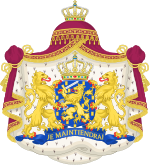Ministry of Social Affairs and Employment
| Ministerie van Sociale Zaken en Werkgelegenheid | |
 Coat of arms of the Netherlands | |
 Ministry of Social Affairs and Employment | |
| Department overview | |
|---|---|
| Formed | 25 September 1918 |
| Jurisdiction | Kingdom of the Netherlands |
| Headquarters | Anna van Hannoverstraat 4, The Hague, Netherlands |
| Annual budget | €81,8 billion (2018)[1] |
| Ministers responsible |
|
| Website | Ministry of Social Affairs and Employment |
The Ministry of Social Affairs and Employment (Template:Lang-nl; SZW) is the Dutch ministry responsible for social affairs, relations between employers and employees, social security, trade unions and emancipation. It was established in 1918 as the Ministry of Labour and had several name changes before it became the Ministry of Social Affairs and Employment in 1981. The ministry is headed by the Minister of Social Affairs and Employment, currently Karien van Gennip of the Christian Democratic Appeal.
| Part of the Politics series |
![Azure, billetty Or a lion with a coronet Or armed and langued Gules holding in his dexter paw a sword Argent hilted Or and in the sinister paw seven arrows Argent pointed and bound together Or. [The seven arrows stand for the seven provinces of the Union of Utrecht.] The shield is crowned with the (Dutch) royal crown and supported by two lions Or armed and langued gules. They stand on a scroll Azure with the text (Or) "Je Maintiendrai" (French for "I will maintain".)](http://upload.wikimedia.org/wikipedia/commons/thumb/8/8f/State_coat_of_arms_of_the_Netherlands.svg/150px-State_coat_of_arms_of_the_Netherlands.svg.png) |
|---|
|
|
Responsibilities
The ministry is responsible for five fields of policy:
- Employment and the labour market
- Social security
- Income-policy
- Relations between employers and employees
- Occupational safety and health
Organisation
The ministry is currently headed by one minister and one state secretary. The ministry's main office is located in The Hague. The civil service is headed by a secretary general (currently Loes Mulder) and a vice-secretary general, who head a system of three general directorates:
- Relations between employers and employees and international affairs
- Occupational safety and Health and social insurances
- Labour market policy and social welfare
Furthermore, there is an inspector general responsible for the inspection of employment and income, who supervises the local centres for employment and income.
Mobility centres
Beginning in 2006, the Ministry established a network of mobility centres whose function is to coordinate the multiple companies of any given industry to facilitate the movement of employees between companies. This is seen as an alternative to forced lay-offs.
History
The ministry was founded in 1933, at the height of the Great Depression. Before that the limited social policy had been the responsibility of the ministry of Economic Affairs. After the Second World War the ministry became much more important, as the Netherlands transformed into a welfare state.
In 1982 the responsibility for labour market policy was transferred to the ministry from the ministry of Economic Affairs in order to enlarge the portfolio of Deputy Prime Minister Joop den Uyl. Emancipation also became a responsibility of the ministry.
References
External links
- (in Dutch) Ministerie van Sociale Zaken en Werkgelegenheid (Rijksoverheid)

